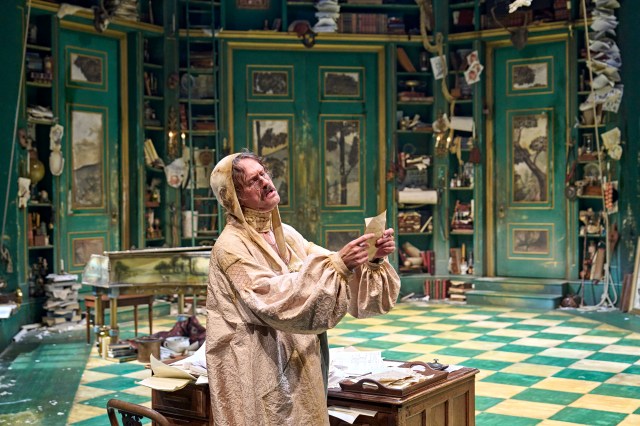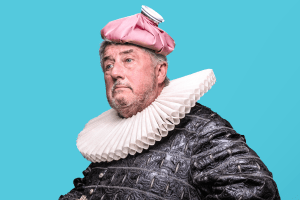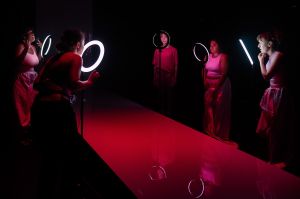The Hypochondriac at Sheffield’s Crucible Theatre – review
Roger McGough’s adaptation of Molière’s classic satire runs until 21 October

Somehow, sitting in the auditorium ten minutes before the start, you know this is going to work. Someone, presumably Jonathan Ainscough, is giving Couperin a right going-over on harpsichord and the set (Colin Richmond) is a thing of wonder. Upstage a row of doors is situated in a mountainous set of shelving that reaches right up to the ceiling, bulging with paper, prescriptions, perhaps, or doctors’ and apothecaries’ bills. The main acting area seems cramped (not an easy feat at the Crucible) with a much-played harpsichord, desk, chairs and so on, but movements are not restricted – except when Sarah Tipple’s direction requires it.
A posse of servants descends on the paper-covered mess of a room and sets about tidying (or not) the piles while singing along to a harpsichord accompaniment, then Argan in his infirmary gown appears, preceded by sound effects of extreme flatulence, and starts bemoaning all his doctors’ bills. Clearly, the evening is not going to be one for students of realistic underplaying – and so it proves, a feast of precisely judged overacting!
Molière’s Le Malade Imaginaire was one of three plays of his adapted by Roger McGough some ten or fifteen years ago for Liverpool Playhouse. It comes up bright and sparkling, in rhyming couplets, but full of modern references. The only named character lost is Argan’s other daughter Louison, but originally Molière included ballet interludes – replaced by clever pastiches by Oliver Birch.
Argan is the hypochondriac, but the plot has two further strands: his second wife Beline professes her love, but needs unmasking as a schemer after his fortune (if any remains after those doctors’ bills) and he wishes his daughter Angelique to marry into a dynasty of medical practitioners so that he can be looked after, but she has fallen for Clèante, a nice worthy sort of chap. Notaries and doctors abound, but it’s the forces of anarchy that finally expose Beline, unite Angelique with Clèante and “cure” Argan.
The cast is cut down to nine, most of them managing stints as servants in between their named parts. Edward Hogg is the recipient of all the doctors’ medicines as Argan, initially tottering, but responding with a fine fury to all attempts to bring him to his senses – his final knowing look makes us wonder how complete the “cure” is.
Many of the supporting actors have their set-piece moments, always handled brilliantly. Toinette (Zweyla Mitchell dos Santos), the wily servant, a typical Molière character and a forerunner of Mozart’s Despina, is pert and knowing, and has her moment in her over-the-top impersonation of an Italian doctor. Then Angelique (Saroja-Lily Ratnavel, fluttering prettily in pink) and Clèante (Zak Ghazi-Torbati), coming to give her a music lesson, embark on a manic “improvised” duet. Doctor Diaforius (Chris Hannon, doubling with the only straightish part, Argan’s forthright brother) and his son Thomas (Garmon Rhys) take us through the full music hall schtick with their range of funny walks to an unexpectedly extended harpsichord introduction before young Thomas delivers appallingly platitudinous speeches coupled with the most grotesque of actions.
Occasionally Molière’s view (and McGough’s) of what a doctor should do pokes through the nonsense – the odd reference to the NHS provoked a round of applause, suggesting that 2023 is a good time to revive the farce.
















